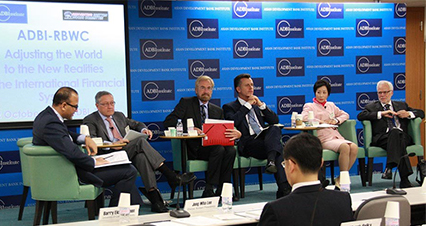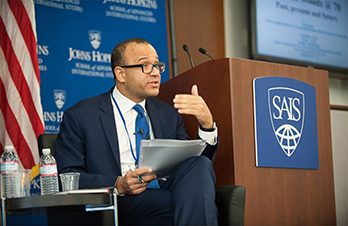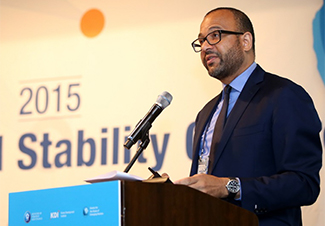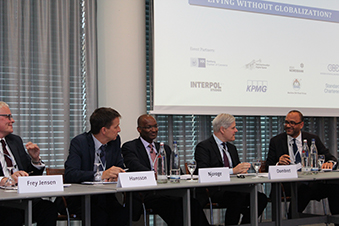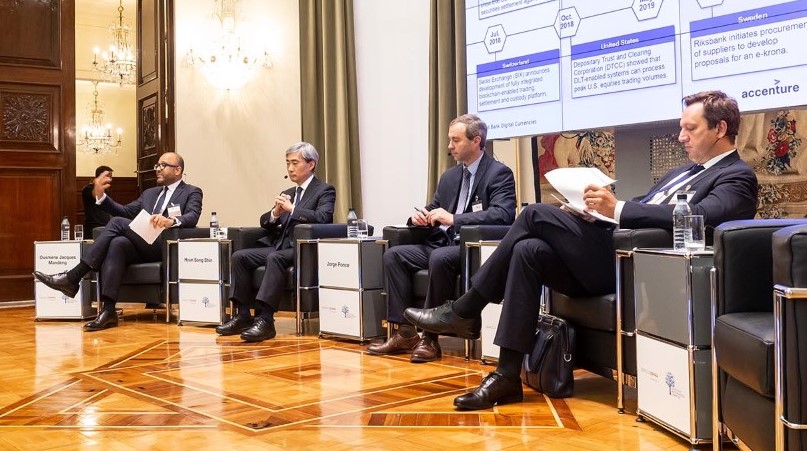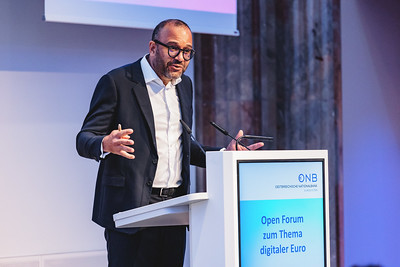Economics Advisory
Ousmène Jacques Mandeng
Financial innovations and international monetary affairs
Economics Advisory offers advisory, speaking, seminars and analysis on international monetary affairs and emerging markets capital markets with a focus on digital currencies and blockchain-based monetary and financial applications, the IMF, history of the international monetary system and emerging markets currencies and capital markets developments.
Recent commentary
Role of central banks in the adoption of smaller currencies
OMFIF Digital Monetary Institute, London 24 July 2024, introductory remarks[...] In my introductory remarks, I shall outline why the role of central banks is critical for the adoption of smaller currencies and why central banks need to assume a proactive role to drive greater currency diversification. While this is relevant for the adoption of central bank digital currencies (CBDC), it shall hold also as a general case. [...]
CBDC and the future of payments integration in Latin America
The Rewiring of the Global Economy, Central Reserve Bank of Peru, 15th Annual Conference, Cusco 19 July 2024, prepared remarks
[...] In my brief introductory remarks, I would like to offer an idea about a regional payments initiative for Latin America based on central bank digital currencies (CBDC) following similar regional initiatives in Europe and in Asia. It could offer a new approach to assess possible trajectories towards greater use of local currencies and financial and economic integration in the region.[...]
From Bretton Woods to the Future: The role of digital money
UBS 30th Reserve Management Seminar 2024, Wolfsberg, 26 June 2024, prepared remarks
[...]I will focus on the international monetary system, its history and lessons learnt, where I think the system will be going and the role digital monies may play. In addressing you the reserve managers, I'm of course addressing the operators of the system. I hope I will be able to provide some insights about the changes I believe the system will see over the short to medium term. I shall argue that the system will become more diversified by currency and by mediums which will naturally be reflected in a shift in the composition of foreign exchange reserves. [...]
International developments around CBDC—The future as we are starting to know it
Austrian National Bank, Open Forum on the digital euro and payment system, Vienna, 25 June 2024
[...] My remarks shall focus on recent developments around central bank digital currencies (CBDC). I'd like to reflect on some fundamental aspects about CBDC, offer a brief history of CBDC projects, then cover on-going CBDC project mBridge, take a quick look at Switzerland on CBDC project Helvetia 3 and comment on new BIS projects Agora and Meridian FX. I hope this will provide you with some insights about the rationale for adopting CBDCs and possible expected impact on payments. I shall also offer some brief comments on the digital euro and why the Eurosystem should be pursuing it. [...]
International Monetary System—What would Triffin do today?
Conference—80 years after Bretton Woods: Relaunching Multilateralism through Regional Monetary Unions, Banco do Portugal, Robert Triffin International, Academia Das Ciências, Lisbon 7 May 2024
Panel discussion—80 years after Bretton Woods. Where do we go from here? What kind of initiative would Robert Triffin promote?
[...] The system as it was envisaged at Bretton Woods 80 years ago, has a rather mixed record. The most problematic one, I believe, is that only very few currencies serve today in international payments producing a high dependency on the so-called key currencies. Herein lies I think the biggest shortcoming that will need to be addressed going forward. I guess it is also what Triffin would lament the most and focus on as the most pressing issue. A new willingness to adopt unconventional approaches often in relation to central bank digital currencies (CBDC) seems to be pointing in the right direction.[...]
Bretton Woods—Why the dollar?
Bretton Woods Committee, blog post, 4 April 2024
The Bretton Woods Conference will celebrate its 80th anniversary this year. The conference can be seen to have formalised the role of the U.S. dollar as the dominant currency in the international monetary system. This remains so to this day as does the considerable controversy it produced. Yet at the time when the conference started on 1 July 1944, it was not at all clear that the dollar would be endowed witch such role. The spirit then was that multiple currencies should be used in international payments with the suggested rationale for this as valid today as it was then. [...]
Bretton Woods—A changed America
Bretton Woods Committee, blog post, 4 March 2024
The Bretton Woods Conference will celebrate its 80th anniversary this year. Driven by a United States keen to involve its partners in international problem-solving, the initial conference may have ultimately proved a high-water mark for multilateral economic policy coordination. The Senate passed the bill to ratify the conference outcomes with a vote of 61 to 16, a stark contrast to the prevailing sentiments in contemporary U.S. politics. Yet the arguments in favour of multilateralism seem as valid today as they were then. [...]
CBDC—New money for new purpose
10 December 2023
Central bank money remains at the heart of national payment systems. Today, central banks offer two formats of money, banknotes to the general public and reserves or scriptural money to banks. The former serves the cash infrastructure and the latter the large value payment system. Central bank money is often the preferred payment instrument. As alternative financial market infrastructures are emerging, central banks will need to consider offering alternatives formats to ensure equitable access to central bank money for eligible entities and that the financial system can benefit from the best possible payment instruments. This is why consideration is given to central bank digital currencies (CBDC). [...]
CBDC—What for and the Maria Theresa Thaler
Reinventing Bretton Woods Committee Conference, Derisiking the transition to a new globalisation, Vienna, 6 December 2023
[...] Professor Feldkircher asked me to answer a number of questions around central bank digital currencies (CBDC) that I will try to address in my short prepared remarks. I have now for about five years been researching CBDC and working on different CBDC projects including among others Jura with the central banks of France and Switzerland, mBridge with the BIS Innovation Hub. Today, most central banks are working on CBDC compared with just a handful when I started. CBDC has triggered a new debate about money, what it does and what it takes to make it successful. That may already have been its biggest contribution. [...]
SVB and stablecoins—Time to tighten regulations
Bretton Woods Committee, blog post, 17 March 2023
The collapse of Silicon Valley Bank and subsequent jitters at USDC shall serve as a reminder that stablecoin regulation remains far too lax. Circle, the U.S. company and issuer of USDC, a stablecoin denominated in U.S. dollar, is mostly regulated in the U.S. as a money transmitter. This is grossly insufficient for a company with US$40 billion in stablecoins outstanding. Regulation and supervision need to impose sufficient obligations for stablecoin issuers to adopt best industry practices. [...]
CBDCs are set to transform how payments are made
Financial Times, 26 January 2023
In the late 19th century, there was controversy in England over what some saw as a usurper to the established monetary order — paper banknotes. At the time, the use of paper currency to complement gold and silver coins was seen by opponents as unduly disruptive and prone to causing instability. [...] A similar debate is under way on the development of central bank digital currencies, which is gathering pace around the world. CBDCs are set to transform how payments can be conducted.[...]
More commentary
Services
Advisory
Strategic advisory work on monetary innovation, central bank digital currencies (CBDC), private digital currencies, and other blockchain-based financial and monetary applications with a focus on public policies and the financial public sector.
Seminars
Organisation of seminars on international monetary affairs and monetary history including on CBDC, crypto-currencies, the International Monetary Fund. Seminars can be arranged in various formats including general public, working dinners, classes, lectures, interviews.
Speaking
Event and keynote addresses and panel discussions on digital currencies and international monetary themes.
Publications
Two key publications by the Reinventing Bretton Woods Committeeon international monetary affairs are now available on Amazon:
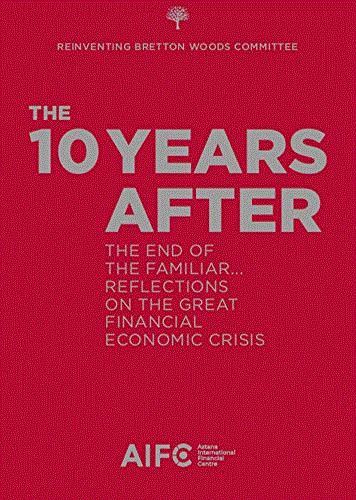

About
Economics Advisory Ltd. is a London-based private limited company registered in England and Wales.
Ousmène Jacques Mandeng, Director, Economics Advisory Ltd, has worked more than 20 years in the financial sector and international organisations on international investment and economic policy analyses and now focuses on the linkages between financial innovation and monetary and payments innovations. He is a Senior Advisor with Accenture in its Blockchain and Multiparty Systems Practice working globally on digital currency solutions.
Ousmène was a Managing Director at Prudential Financial and UBS Investment Bank leading coverage of official financial institutions globally. He worked at the International Monetary Fund, last as Deputy Division Chief coordinating work on IMF lending policies and use of IMF resources and on Latin America including as a Resident Representative. He has commented periodically in the financial press and presented in leading international forums on the international monetary system and emerging markets capital markets developments.
He is a Visiting Fellow at the School of Public Policy at the London School of Economics and Political Science, a Fellow of the Reinvention Bretton Woods Committee and a Member of the Bretton Woods Committee and of Robert Triffin International. He is fluent in German, English, French and Spanish. He holds an MPhil in economics from the University of Cambridge and a PhD in economic history from the LSE.
All views expressed in this blog are those of Economics Advisory and not necessarily those of Accenture or other clients.
Contact
Subscribe
Get news from Economics Advisory into your inbox
